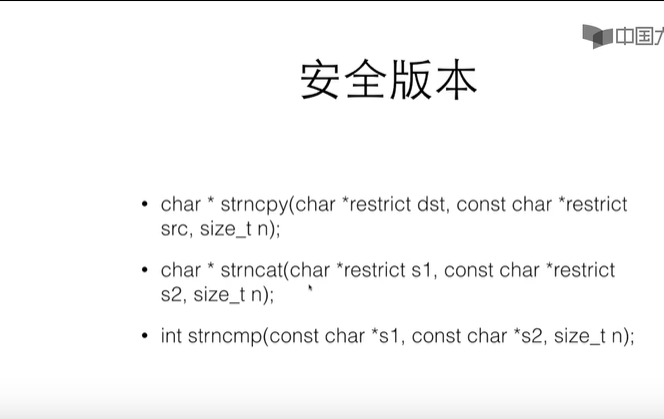C语言入门-字符串
还是要继续学习,每天给自己打气。
字符数组
char word[] = {'H','e','l','l','o'};
这不是c语言的字符串,不能用字符串的方式做计算
一、字符串
char word[] = {'H','e','l','l','o','\0'};
区别就是最后多了一个0,这就成为了字符串
- 以0(整数0)结尾的一串字符
- 0或'\0'是一样的,但和'0'不同
- 0标志字符串的结束,但它不是字符串的一部分
- 计算字符串长度的时候不包含这个0
- 字符串以数组的形式存在,以数组或者指针的形式访问,更多的是以指针的形式
- string.h里有很多处理字符串的函数
字符串变量
char *str = "hello";
char word[] = "hello";
char line[10] = "hello";
字符串常量
- “hello”
- “hello"会被编译器变成一个字符数组放在某处,这个数组的长度是6,结尾还有表示结束的0
- 两个相邻的字符串常量会被自动连接起来
字符串
- c语言的字符串是以字符数组的形态存在的
- 不能用运算符对字符串做运算
- 通过数组的方式可以遍历字符串
- 唯一特殊的地方是字符串字面量可以用来初始化字符数组
二、字符串常量
char *s = "hello world";
- s是一个指针,初始化为指向一个字符串常量
- 由于这个常量所在的地方,所有实际上s是const char* s ,但是由于历史的原因,编译器接受不带const的写法
- 但试图对s所指的字符串做写入会导致严重的后果
- 如果需要修改字符串,应该用数组
char s[] = "hello , world!";
指针还是数组
char *str = "hello";
char word[] = "hello";
数组:可以读,可以写
指针:只能读,不能修改
如果要构造一个字符串 ------>数组
如果要处理一个字符串 ------>指针
char*是字符串
- 字符串可以表达为char*的形式
- char*不一定是字符串
- 本意是指向字符串的指针,可能指向的是字符的数组
- 只有它所指的字符数组的结尾有0,才能说它所指的是字符串
#include <stdio.h>
int main(void)
{
char *s = "hello world";
char *s1 = "hello world";
char s3[] = "hello world";
// 这个是不能修改的
// s[0] = 'B';
s3[0] = 'B';
printf("%p\n", s);
printf("%p\n", s1);
printf("%p\n", s3);
printf("Here! s[0]=%c\n", s[0]);
printf("Here! s3[0]=%c\n", s3[0]);
// 0000000000404000
// 0000000000404000
// 000000000062FE30
// Here! s[0]=h
// Here! s3[0]=B
return 0;
}
三、字符串的输入和输出
字符串赋值
char *t = 'title';
char *s;
s = t;
并没有产生新的字符串,只是让指针s指向了t所指的字符串,对s的任何操作就是对t做的
字符串输入和输出
char string[8];
scanf("%s" , string);
printf("%s" , string);
scanf读入一个单词(到空格、tab、回车为止)
scanf是不安全的,因为不知道要读入的内容的长度
常见错误
- char *string;
- scanf("%s" , string);
- 以为char*是字符串类型,定义了一个字符串类型的变量string就可以直接使用了
- 由于没有对string初始化0 , 所以不一定每次运行都出错
四、单字符输入和输出
int putchar(int c);
- 向标准输出写一个字符
- 返回写了几个字符,EOF(-1)表示写失败
int getchar(void);
- 从标准输入读入一个字符
- 返回类型是int是为了返回EOF(-1) windows --->Ctrl-z
五、字符串函数strlen
- size_t strlen(const char *s);
- 返回s的字符串长度(不包括结尾的0)
#include <stdio.h>
#include <string.h>
int main(int argc, char const *argv[])
{
char line[] = "hello";
printf("strlen=%lu\n", strlen(line));
printf("sizeof=%lu\n", sizeof(line));
return 0;
}
//strlen=5
// 这个包括了字符串最后的0
//sizeof=6
当然了,也可以自己写一个函数来计算字符串长度
#include <stdio.h>
#include <string.h>
// 自定义方法来计算字符串长度
int mylen(const char *s)
{
int idx = 0;
while ( s[idx] != '\0' ){
idx++;
}
return idx;
}
int main(int argc, char const *argv[])
{
char line[] = "hello";
printf("strlen=%lu\n", mylen(line));
printf("sizeof=%lu\n", sizeof(line));
return 0;
}
六、字符串函数strcmp
- int strcmp(const char *s1 , const char *s2);
- 比较两个字符串返回:
- 0:s1 == s2
- 1: s1 > s2
- -1: s1 < s2
七、字符串函数strcpy
- char* strcpy(char *restrict dst , const char * restrict src);
- 把src的字符串拷贝到dst
- restrict表明src和dst不重叠(c99)
- 返回dst,为了能连起代码来
复制一个字符串
char *dst = (char*)malloc(Strlen(src)+1);
strcpy(dst , src);
八、字符串strcat
- char* strcat(char *restrict s1 , const char *restrict s2);
- 把s2拷贝到s1的后面,接成一个长的字符串
- 返回s1
- s1必须具有足够的空间
但是这些函数都是不安全的,因为你不知道有没有足够的空间,所以
安全版本:如图

九、字符串搜索函数
- char * strchr(const char *s , int c);
- char * strrchr(const chat *s int c);
- 返回NULL表示没有找到
#include <stdio.h>
#include <string.h>
#include <stdlib.h>
int main(int argc, char const *argv[])
{
char s[] = "hello";
char *p = strchr(s, 'l');
// 找到第二个l
p = strchr(p+1,'l');
printf("%s\n", p);
return 0;
}
复制给另一个
#include <stdio.h>
#include <string.h>
#include <stdlib.h>
int main(int argc, char const *argv[])
{
char s[] = "hello";
char *p = strchr(s, 'l');
char *t = (char*)malloc(strlen(p)+1);
strcpy(t,p);
printf("%s\n", t);
free(t);
// llo
return 0;
}
作者:山丘!
-------------------------------------------
你闻讯而来,我大喜过望,我在这等你,你又在哪呢?喜欢的话加一个“关注”呗!
如果觉得这篇文章对你有小小的帮助的话,记得在右下角点个“推荐”哦,博主在此感谢!



 浙公网安备 33010602011771号
浙公网安备 33010602011771号